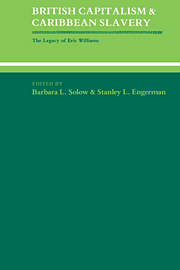Book contents
- Frontmatter
- Contents
- List of Contributors
- Preface
- British Capitalism and Caribbean Slavery: The Legacy of Eric Williams: An Introduction
- Part I Slavery as an Economic Phenomenon
- Race and Slavery: Considerations on the Williams Thesis
- Part II Caribbean Slavery and the Industrial Revolution
- Part III The Decline of the British West Indies
- Part IV The Basis of Abolition and Emancipation
- Part V Capitalism and Slavery in Historical Perspective
Race and Slavery: Considerations on the Williams Thesis
Published online by Cambridge University Press: 15 December 2009
- Frontmatter
- Contents
- List of Contributors
- Preface
- British Capitalism and Caribbean Slavery: The Legacy of Eric Williams: An Introduction
- Part I Slavery as an Economic Phenomenon
- Race and Slavery: Considerations on the Williams Thesis
- Part II Caribbean Slavery and the Industrial Revolution
- Part III The Decline of the British West Indies
- Part IV The Basis of Abolition and Emancipation
- Part V Capitalism and Slavery in Historical Perspective
Summary
No history is timeless. Works inspired by the exigencies of contemporary politics are least likely to enjoy enduring acclaim. Eric Williams's Capitalism and Slavery is a politically inspired book, and it has, at long last, begun to exhibit advancing age. But one dare not write its obituary. Whenever in the past Williams's work has appeared irreparably discredited, some new academic physician has breathed fresh life into the old pages.
How do we account for its durability? That it embraces the salient issues which have gripped much of the historical profession in recent decades—racism, slavery, the origins of industrialization, and the evolution of a world order deeply divided between rich and poor—is a partial but insufficient explanation. In treating these questions, Williams challenges our collective self-esteem He repudiates Anglo-Saxon heroes, renders ascribed nobility ignoble, and raises doubts whether the most honored economic achievements of the North Atlantic nations are, in reality, the reward of superior energy, organization, and inventiveness. Although his text is laden with moral purpose, it rigorously, almost ostentatiously, rejects moral sentimentality. He proffers no diatribe, just the systematic application of a stringent intellectual chemical—the doctrine of economic necessity—to our most cherished notions. An iconoclast, not a Marxist, he challenged the Anglo–American historical establishment on its own philosophical turf: Smith, Wakefield, and Merivale, not Marx, were his esteemed theoretical forebears.
- Type
- Chapter
- Information
- British Capitalism and Caribbean SlaveryThe Legacy of Eric Williams, pp. 25 - 50Publisher: Cambridge University PressPrint publication year: 1988
- 5
- Cited by

